
The Federal Government has resolved to inject over N600bn as stimulus response into Nigeria’s agricultural sector, the Minister of Agriculture and Rural Development, Sabo Nanono, has said.
Nanono said the fund would target small scale farmers to ensure food security and sustainability.
He disclosed this while on a tour of Dangote Fertiliser Plant and during a crucial meeting with other fertiliser companies in Lagos to galvanise their cooperation for the production of inputs.
The minister’s comments were contained in a statement issued on Sunday in Abuja by the Director, Information, Federal Ministry of Agriculture and Rural Development, Theodore Ogaziechi.
Nanono explained that the N600bn stimulus response which targets farmers nationwide would take off with an initial 2.4 million farmers in the first instance.
He further explained that to avoid the abuse of government funds and good intentions, the support would be in kind, as it would come in the form of inputs and not cash as was practiced in the past.
The minister added that the forceful closure of all international borders, necessitated by the COVID-19 pandemic, had made it evident that Nigeria could conveniently and sustainably feed itself.
Nanono pledged to support the farming communities in Lagos with rural roads, solar lighting and water boreholes so as to empower them to increase productivity.
He promised to collaborate with the Lagos State Government in the fishing sector to tap the potential of the state’s marine endowments and reduce the importation of fish in Nigeria.
In his response, the Governor of Lagos State, Babajide Sanwo-Olu, promised to collaborate with the Federal Government not only in the fishing sector but also to join forces to embark on mechanised farming.
The governor said Lagos would complement the Federal Government’s effort when it completes its rice mill project, describing it as the largest rice mill in Nigeria with a capacity to mill approximately 30 million metric tonnes of rice per annum.
This, he said, would help Nigeria focus more on the exportation of rice and the downward review of prices at the retail market.
In another engagement, the agriculture minister and his Permanent Secretary, Abdulkadir Mu’azu, interacted with agro-input dealers in Lagos to discuss quality, affordability and availability of fertilisers across the country.
Fertiliser dealers at the meeting told the minister that raw materials for fertiliser blending, most especially Ammonium phosphate, was the major challenge confronting the production of the commodity in Nigeria.
By Okechukwu Nnodim











